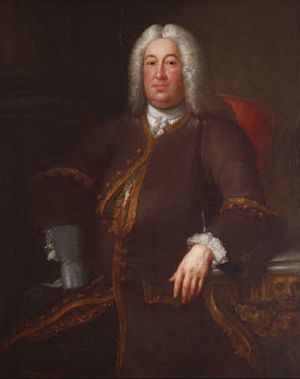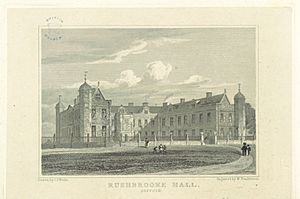Sir Robert Davers, 2nd Baronet facts for kids
Quick facts for kids
Sir Robert Davers, 2nd Baronet
|
|
|---|---|

Sir Robert Davers, 2nd Baronet by Jonathan Richardson, c.1700
|
|
| Born | c.1653 Barbados |
| Died | 1 October 1722 Rushbrooke Hall, Suffolk, England |
| Father | Sir Robert Davers, 1st Baronet |
| Mother | Eleanor Luke |
| Occupation | Politician, landowner and slavetrader |
Sir Robert Davers, 2nd Baronet (born around 1653 – died October 1, 1722), was an important English politician and landowner. He was also involved in the business of trading enslaved people. He lived at Rougham and later at Rushbrooke Hall in Suffolk, England.
Contents
Early Life and Family
Sir Robert Davers was the only son of Sir Robert Davers, 1st Baronet, and Eleanor Luke. His father had become very wealthy from a large farm in Barbados. This farm used the forced labor of about 200 enslaved African people.
Growing Up in Barbados
Sir Robert Davers was born in Barbados. He moved to England between 1680 and 1682. He then returned to Barbados and became a member of the Council there on June 13, 1682. By November 1683, he was a Baron of the Court of Exchequer and Pleas in Barbados.
Becoming a Baronet
In 1684, Sir Robert inherited his father's title, becoming the 2nd Baronet. A baronet is a special title of honor, passed down through families. He was chosen to be the High Sheriff of Suffolk in 1685, but he did not take on this role. Even after moving to England, he continued to be involved in the business of trading enslaved people to Barbados for the rest of his life.
Political Career in England
Sir Robert Davers moved back to England for good in 1687. He soon became involved in politics.
First Steps in Parliament
In 1688, his wife's uncle, Lord Dover, suggested Davers run for Parliament in Bury St Edmunds. However, Davers did not want to run at that time. People who supported King James II of England soon realized that Davers would not agree with their plans if he were elected.
Serving as a Member of Parliament
In 1689, Davers won the election to become a Member of Parliament for Bury St Edmunds. In the Parliament that followed, Davers voted with a group called the Jacobites. They believed that the throne should not be empty after King James II left England.
He was part of 35 different committees in Parliament. His only recorded speech was against spending more money on the English effort in the Nine Years' War. After 1690, he became friends with Robert Harley and usually voted with the Tory party.
Later Political Roles
From 1691 to 1714, he was a Gentleman of the Privy Chamber for King William III and Queen Anne. This was an important position in the royal household. Even though he signed an agreement in 1696 to support the king, he was also a member of a Tory group called the October Club.
In 1700, he became a justice of the peace for Suffolk. This meant he helped keep law and order in the area. He served as an MP for Bury St Edmunds again from 1703 to 1705. After that, he was elected MP for Suffolk and held that seat until he died in 1722. In 1721, his name was on a list of important politicians who might have supported James Francis Edward Stuart, who also wanted to be king.
Personal Life and Family Home
Sir Robert Davers married Mary Jermyn on February 2, 1682. She was the daughter of Thomas Jermyn, 2nd Baron Jermyn. They had five sons and five daughters.
Acquiring Rushbrooke Hall
Through his marriage, Sir Robert gained part of the Rushbrooke Hall estate in 1703. He then bought the rest of the estate from his wife's sister. Between 1705 and 1710, he sold his Rougham estate to his son-in-law, Clement Corrance. Rushbrooke Hall then became the main family home for the Davers family. Lady Davers passed away ten days after her husband in 1722. Sir Robert was succeeded as baronet by his son, also named Robert.
 | Shirley Ann Jackson |
 | Garett Morgan |
 | J. Ernest Wilkins Jr. |
 | Elijah McCoy |


